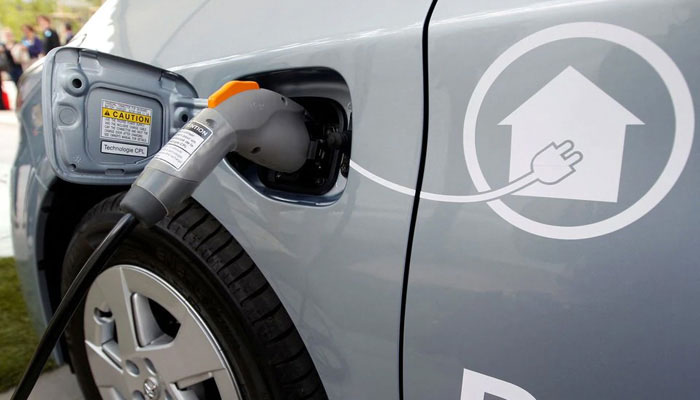Powering the future
EVs are likely going to become a mass-market product despite some concerns about the pace of growth
The Sustainable Development Agenda 2030 adopted by UN member-states has shifted the world towards a more sustainable and environment friendly transportation sector.
Electric vehicles (EV) are considered as an excellent innovation in this regard. EVs are likely going to become a mass-market product despite some concerns about the pace of growth. Pakistan is also exploring the potential of EVs but despite various benefits, their adoption in Pakistan faces significant challenges.
The primary challenge is the limited number of charging stations to facilitate the operation of EVs. Power supply in Pakistan is often unreliable which aggravates the issue of limited charging infrastructure.
Second, lack of awareness among the public about technology is another challenge. This limited knowledge makes it difficult to promote the adoption of EVs, especially when fossil fuel powered vehicles have been the norm for decades.
Third, EVs are expensive and not easily accessible to the people. Their manufacturing is dependent on imports, thus making them vulnerable to foreign exchange rate fluctuation.
These challenges, coupled with the country’s economic condition, demand a workable solution to facilitate the adoption of EVs in Pakistan. Public Private Partnership (PPP) can be a viable option to tackle the challenges as PPP is an arrangement for coordination and cooperation of the private and public sectors around the world.
PPP has enhanced the economic value of different projects and contributed to the growth of infrastructure projects in particular. The main idea of the PPP scheme is public and private sector collaboration with different tiers of responsibilities and involvement as well as to provide public and infrastructure services more proficiently
Public-Private Partnerships (PPPs) are crucial for addressing the challenges associated with electric vehicle (EV) adoption in Pakistan. First, in terms of infrastructure development, PPPs can be pivotal in establishing a comprehensive charging network, significantly alleviating the pressure on the government to meet the growing demand for charging infrastructure. A well-structured PPP model that integrates the private sector can expedite this process, ensuring that the infrastructure challenge is effectively addressed.
Second, affordability is another key area where PPPs can make a difference. By offering financing options, subsidies, or incentives, PPPs can help make EVs more accessible to a broader population. A carefully designed PPP model can promote local assembly and manufacturing of EVs, reducing dependency on imports and making them more cost-effective.
Third, the Public Private Partnership Authority (PPPA) of Pakistan can play a vital role in formulating supportive policies, including tax incentives, subsidies, and regulations that encourage EV adoption. A coordinated awareness campaign, potentially led through PPPs, can educate the public on the benefits of EVs, such as reduced greenhouse gas emissions and lower operating costs.
PPPs also offer a valuable opportunity to foster collaboration between the public and private sectors in promoting EVs for public transportation, such as buses and taxis, to reduce emissions and operating costs. Lastly, PPPs can drive investment in research and development, enhancing EV technology to better suit Pakistan’s unique conditions.
Some suggested a potential PPP model which can be adopted in Pakistan to favour EV adoption. This includes: oint ventures between government, private companies, and investors; concessions and build-operate-transfer (BOT) models for infrastructure development; public-private joint ventures for local manufacturing and assembly; and collaborative R&D initiatives.
So while EVs face significant challenges in Pakistan, public-private partnerships can help overcome these hurdles. By investing in infrastructure, affordability, awareness, and local manufacturing, PPPs can pave the way for a sustainable and environment friendly transportation sector in Pakistan.
The government, private sector, and public must work together to create a conducive environment for EV adoption, ensuring a cleaner and greener future for generations to come. The PPPA needs to consider the viability and execution methodology to undertake EV projects via proper PPP models in Pakistan.
The writer is an independent
consultant and can be reached at: waseemalitipu@gmail.com
-
 Kate Middleton May Break Because Of Andrew Mountbatten-Windsor & Expert Speaks Out
Kate Middleton May Break Because Of Andrew Mountbatten-Windsor & Expert Speaks Out -
 Tom Cruise, Nicole Kidman Mend Their Relationship Following The Murder Of Rob Reiner, Wife Michelle Reiner?
Tom Cruise, Nicole Kidman Mend Their Relationship Following The Murder Of Rob Reiner, Wife Michelle Reiner? -
 Celebrities Who Struggle With Infertility
Celebrities Who Struggle With Infertility -
 Is Social Media Addiction Real? Experts Explain Signs And How To Cut Back
Is Social Media Addiction Real? Experts Explain Signs And How To Cut Back -
 Can App Stores Really Keep Kids Off Social Media? Here’s What Experts Says
Can App Stores Really Keep Kids Off Social Media? Here’s What Experts Says -
 Margot Robbie Fears Being Dubbed A 'dumb Blonde' Due To Major Reasons: 'Hates The Idea'
Margot Robbie Fears Being Dubbed A 'dumb Blonde' Due To Major Reasons: 'Hates The Idea' -
 How Kate Middleton's Hyperemesis Gravidarum Left Her 'not The Happiest'
How Kate Middleton's Hyperemesis Gravidarum Left Her 'not The Happiest' -
 USA Beats Canada For First Olympic Hockey Gold In 46 Years; Donald Trump, Barack Obama & Others Hail Historic Victory
USA Beats Canada For First Olympic Hockey Gold In 46 Years; Donald Trump, Barack Obama & Others Hail Historic Victory -
 Claressa Shields Defeats Franchon Crews-Dezurn In Heavyweight Title Rematch
Claressa Shields Defeats Franchon Crews-Dezurn In Heavyweight Title Rematch -
 Sam Altman Calls Elon Musk’s Space Data Center Plan ‘ridiculous’
Sam Altman Calls Elon Musk’s Space Data Center Plan ‘ridiculous’ -
 Kara Braxton, WNBA All-Star And Champion, Dies At 43
Kara Braxton, WNBA All-Star And Champion, Dies At 43 -
 Anthropic Lead Engineer Predicts ‘software Engineer’ Role Can Disappear By 2026
Anthropic Lead Engineer Predicts ‘software Engineer’ Role Can Disappear By 2026 -
 Sharon Details Late Husband Ozzy's Final Days During His Sickness
Sharon Details Late Husband Ozzy's Final Days During His Sickness -
 Magic Vs Clippers: Clippers Announce Kawhi Leonard Status After Exit
Magic Vs Clippers: Clippers Announce Kawhi Leonard Status After Exit -
 BTC Price Today: Bitcoin Sinks Below $65K On Trade Uncertainty
BTC Price Today: Bitcoin Sinks Below $65K On Trade Uncertainty -
 'A Knight Of The Seven Kingdoms': All You Need To Know About The Finale
'A Knight Of The Seven Kingdoms': All You Need To Know About The Finale




